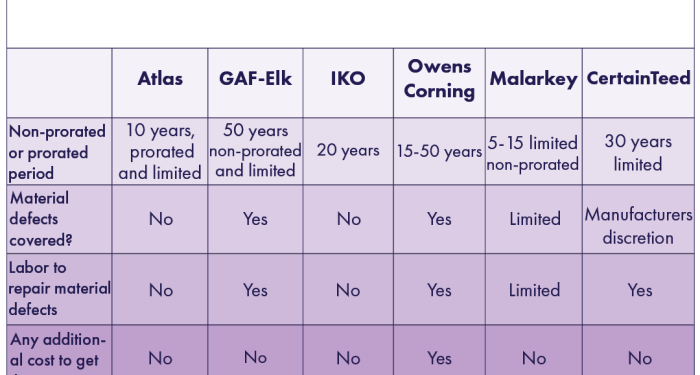Diving into the realm of roofing warranty options, this introduction sets the stage for a detailed exploration of the various choices available to homeowners. Understanding the importance of selecting the right warranty can make a significant impact on long-term maintenance costs and overall peace of mind.
From manufacturer warranties to extended warranties, the world of roofing guarantees is vast and varied. Let's uncover the intricacies together.
As we delve deeper, we will uncover the different types of roofing warranties, factors to consider when evaluating them, and essential tips for selecting the most suitable one for your specific needs. Stay tuned for a comprehensive breakdown of roofing warranty options that will help you navigate this crucial aspect of homeownership with confidence.
Importance of Understanding Roofing Warranty Options
Understanding roofing warranty options is crucial for homeowners to make informed decisions that can impact their long-term maintenance costs and overall satisfaction with their roofing system.Impact on Long-Term Maintenance Costs
Choosing the right warranty can significantly affect long-term maintenance costs. For example, a comprehensive warranty that covers both material defects and workmanship issues can save homeowners from unexpected expenses for repairs or replacements.Variability Based on Roofing Material
Warranty options vary depending on the type of roofing material used. For instance, warranties for asphalt shingles may differ from those for metal roofing or clay tiles. It is essential for homeowners to understand these variations to ensure they select the most suitable warranty for their specific roofing material.Types of Roofing Warranties
When it comes to roofing warranties, there are several types available in the market, each offering different coverage and protection for your roof. It's essential to understand the differences between these warranties to ensure you choose the right one for your needs.Manufacturer Warranties
Manufacturer warranties are provided by the company that produces the roofing materials. These warranties typically cover defects in the materials used for a specified period. However, it's essential to note that most manufacturer warranties do not cover the cost of labor for repairs or replacement.Contractor Warranties
Contractor warranties are offered by the roofing contractor who installs the roof. These warranties cover the workmanship of the installation and may vary in duration. It's crucial to review the terms and conditions of the contractor warranty to understand what is included and any limitations.Extended Warranties
Extended warranties are additional warranties that can be purchased to extend the coverage of the manufacturer or contractor warranty. These warranties may provide more comprehensive coverage, including labor costs for repairs or replacement. However, extended warranties often come with specific conditions and may require regular maintenance to remain valid.Examples of common terms and conditions found in roofing warranties include:- Coverage period (e.g., 10 years, 20 years, lifetime)
- Exclusions (e.g., damage from natural disasters, improper maintenance)
- Transferability (whether the warranty can be transferred to a new homeowner)
- Required maintenance (such as regular inspections or repairs)
Factors to Consider When Evaluating Roofing Warranties
When evaluating roofing warranties, homeowners should take into account various key factors to ensure they are getting adequate coverage and protection for their investment. It is crucial to carefully review the terms and conditions of the warranty to understand what is included and excluded in the coverage.Coverage Duration
- Consider the length of the warranty coverage, as longer durations typically indicate a higher level of protection.
- Look for warranties that offer coverage for at least 20-30 years to ensure long-term peace of mind.
Transferability
- Check if the warranty is transferable in case you sell your home, as this can add value to your property.
- Some warranties allow for transfer to new homeowners, while others may require a fee or have restrictions.
Exclusions
- Pay close attention to the exclusions listed in the warranty, as they define what is not covered by the warranty.
- Common exclusions may include damage from natural disasters, improper installation, or lack of maintenance.
Tips for Choosing the Right Roofing Warranty
When selecting a roofing warranty, homeowners must carefully consider various factors to ensure they choose the most suitable option for their needs. Here is a step-by-step guide to help you make an informed decision:Assessing the Reliability of Warranty Providers
- Research the reputation of the warranty provider in the industry and among customers.
- Check for any complaints or negative reviews about the provider's warranty services.
- Look for certifications or accreditations that indicate the reliability of the warranty provider.
- Consider the provider's experience and track record in honoring warranty claims.
Matching the Warranty with the Specific Roofing System and Installation
- Understand the type of roofing system you have and its specific requirements.
- Ensure that the warranty covers the materials used in your roofing system.
- Verify that the installation of the roofing system meets the warranty requirements.
- Consult with a professional roofer to ensure the warranty aligns with your roofing system.















